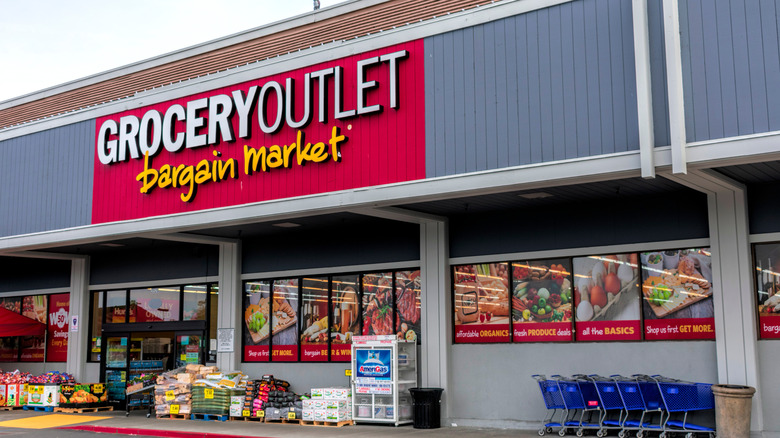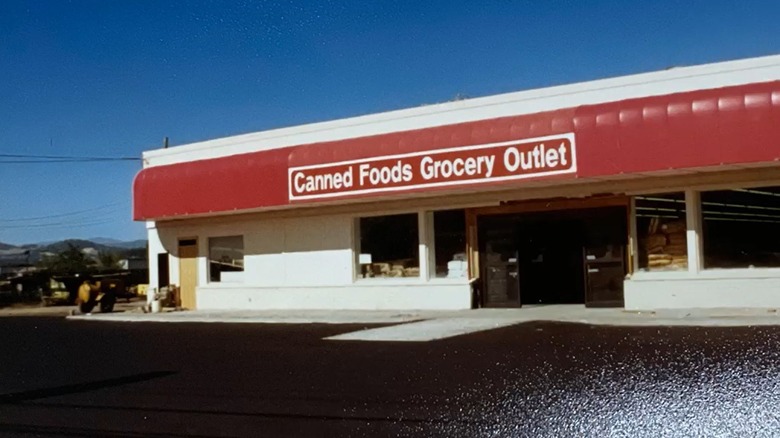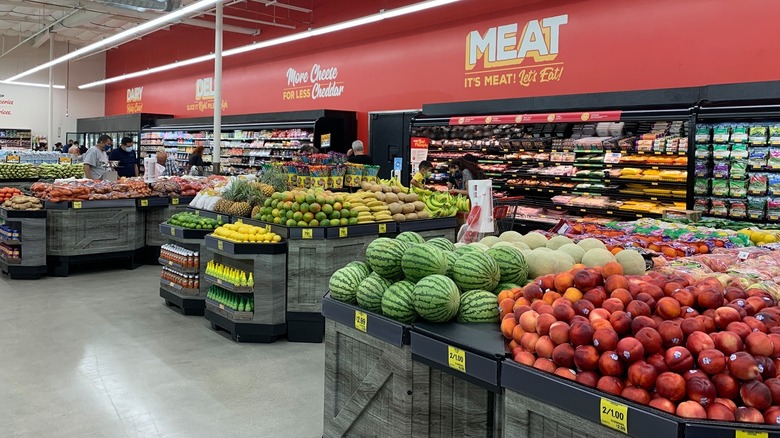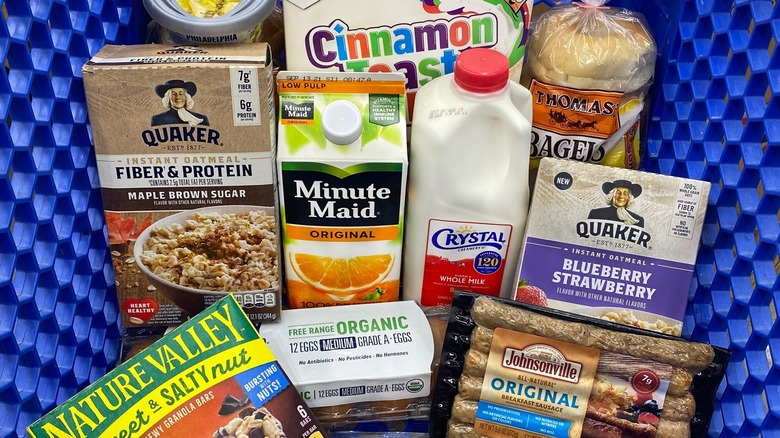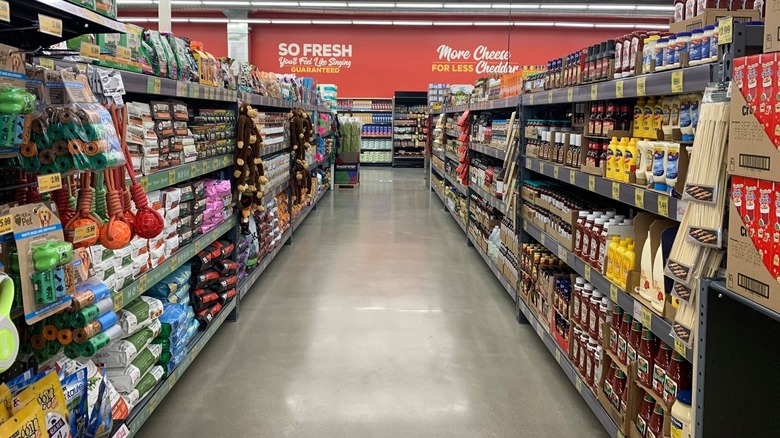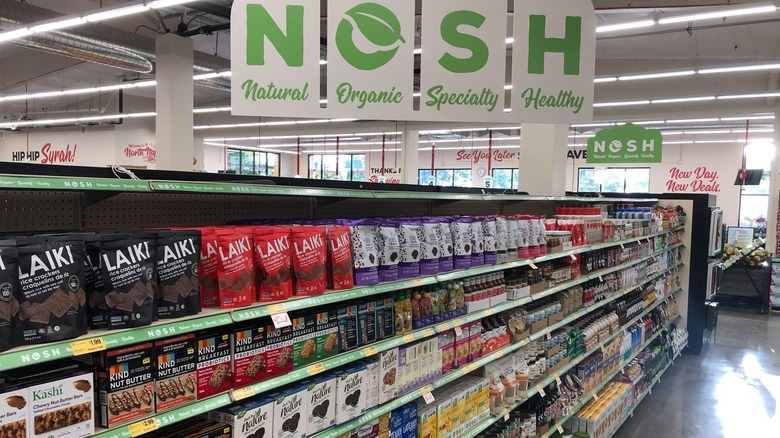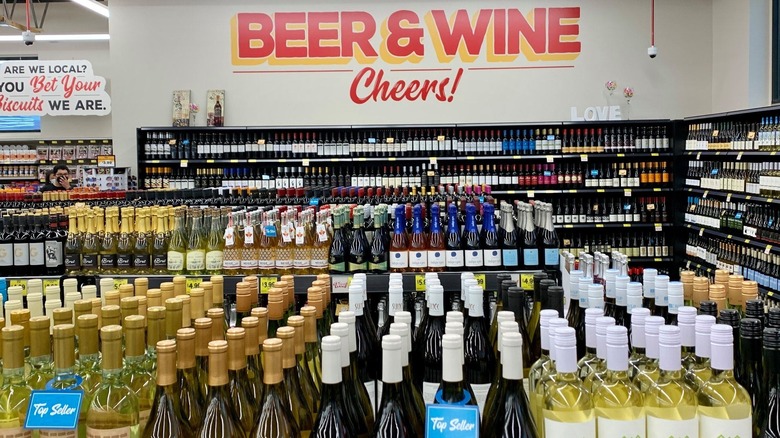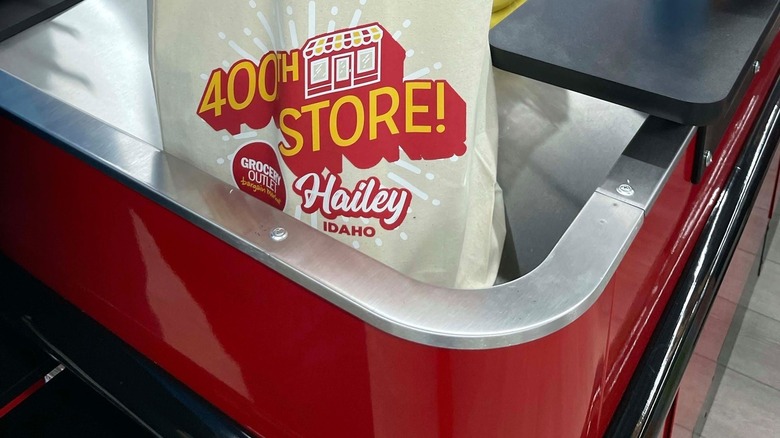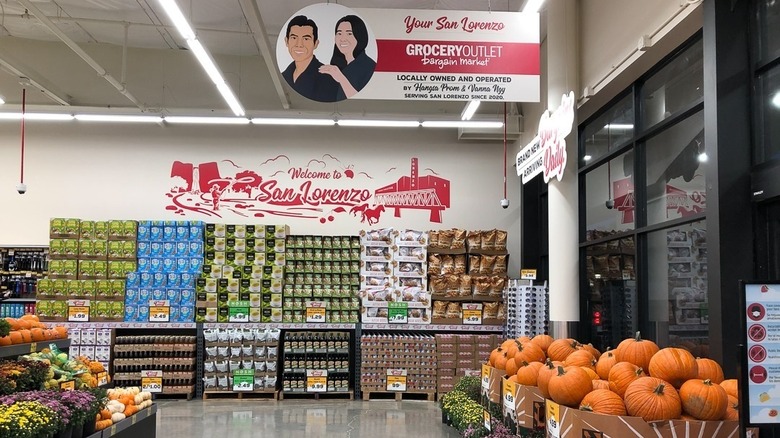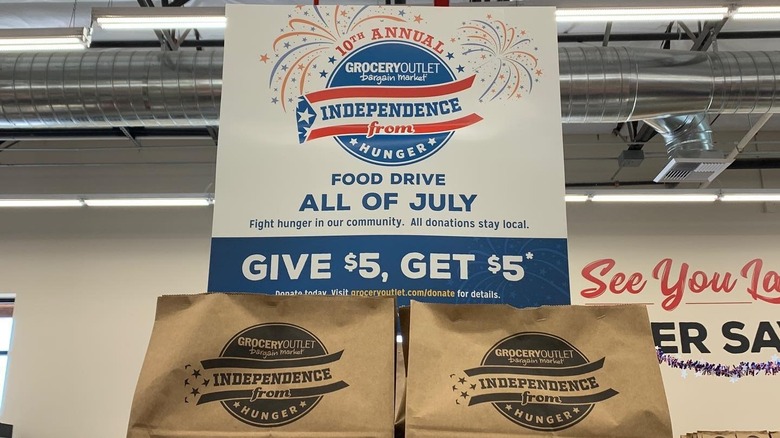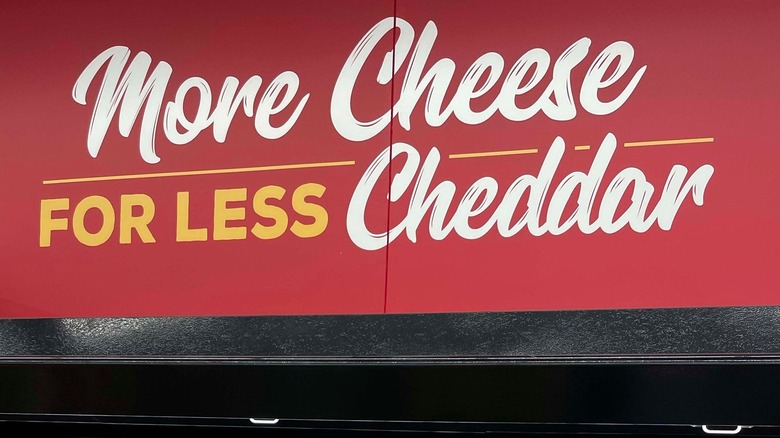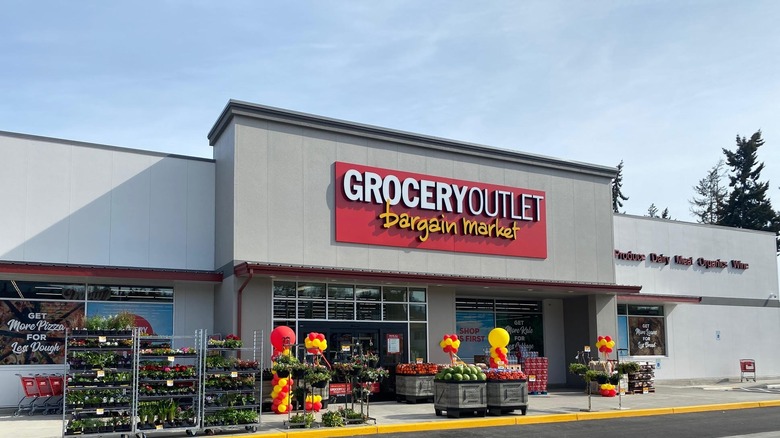The Untold Truth Of Grocery Outlet
While it may not have the cult cachet of Trader Joe's or Aldi, Grocery Outlet boasts its own unique allure of low prices and hidden gems. If you're after affordable groceries and big savings on brand name items — and are willing to be flexible when it comes to your shopping list — Grocery Outlet Bargain Market, as it's officially known, is a great place to stop.
This growing grocery chain, which bills itself as an "extreme value" store, started in San Francisco but is actively expanding to the East Coast and elsewhere. Because it works a bit differently than your average supermarket, there are some things to keep in mind when shopping at Grocery Outlet, like the importance of a treasure-hunting attitude, and an understanding of how they source their products.
The business has interesting origins, too. So whether you've never heard of it or are a die-hard fan already, here's everything you need to know about Grocery Outlet.
Grocery Outlet started as a military surplus store in 1946
At the close of WWII, the U.S. government had "vast quantities of war materials no longer needed for military purposes" — army-fueling C-rations among them — and canned goods manufacturers faced a similar problem. War History Online outlines how America's canned food and drink craze was partially due to excess WWII rations, with companies pivoting to sell surplus stock directly to civilians, emphasizing how convenient their shelf-stable goods were for modern cooks. Increasing prosperity meant more people could afford to buy processed food too — but shoppers have also always loved a bargain.
It was a perfect time for Jim Read to open Cannery Sales in San Francisco, which sold military surplus items at low prices and eventually grew into a deep-discount grocery store empire. The business went through a few more names and iterations before being rechristened as Grocery Outlet in 1987. As of 2009, the full, official name is Grocery Outlet Bargain Market, which reflects their ever-increasing diversity of offerings while also signaling their inherent value proposition loud and clear.
Fresh produce wasn't sold in stores until 1999 and fresh meat, not until 2003
Today, you'll find all sorts of stuff at Grocery Outlet, including beauty products, home goods, pet food, plants, seasonal decor, and more. They've sold frozen foods since the 1980s, but it wasn't until just before the new millennium that Grocery Outlet began selling fresh fruit and vegetables. Fresh meat didn't hit their refrigerator cases until a few years after that.
While there's still no standard supermarket butcher counter where specific cuts of chicken and beef can be portioned out for you, you might find anything from ribeye steaks to sockeye salmon fillets at Grocery Outlet. When it comes to fruits and veggies, staples like apples, bananas, and bagged salads are almost always in stock, but be on the look out for organic produce at Grocery Outlet too. It's often an especially good deal compared to what you'd pay at other stores. Overall, Grocery Outlet prices clock in anywhere from 40% to 70% lower than other markets.
To ensure you get the most bang for your buck, just remember to look at the sell-by, use-by, and freeze-by dates on all fresh items in particular. That goes double if you plan to stock up. The inclination to hoard is only natural when you find a really great bargain, but don't buy more than you can eat or freeze before it goes bad. (And know that you probably have a little more wiggle room there than you might think.)
Grocery Outlet keeps prices low by buying surplus goods
The chief reason Grocery Outlet is able to sell goods at such low prices is due to their practice of opportunistic buying. Many discount grocery stores depend on grocery reclamation centers, but Grocery Outlet often touts their "unique relationship" with their supplier partners, who contact them when they need a buyer for excess stock of items. These items may be nearing their sell-by date (but are not expired or unsafe), may have been discontinued (for instance, less-popular flavors of chips or crackers), or may even simply have packaging defects that don't affect the quality of the contents.
Per a self-identified Grocery Outlet employee on Quora, think of a scenario in which "Coke makes way more Christmas themed cans than they have market for; many stores won't keep these perfectly good Cokes on their shelves in March but GO will take them at a very discounted rate and sell them to us for a marked down price."
Grocery Outlet sources some things — like milk, meat, butter, and eggs — just like any other grocery store, since these items can't usually be opportunistically sourced and they want to ensure they're always on shelves.
The inventory is always changing
The business model that makes Grocery Outlet's prices so low is also what means you never know exactly what you'll find in stores (and why, if you have a very specific shopping list, you might need to make this a secondary stop — or go here first and then make a detour for anything you didn't snag). Basically, just like the store's purchasing team, you are also going to be practicing opportunistic buying.
You'll probably find at least a couple kinds of canned beans and sliced bread and be able to replenish your frozen vegetable stash no problem, but don't expect dozens of different salad dressing selections and an entire wall of every potato chip brand that exists.
Do be on the lookout for more unusual items, like Old Bay hot sauce, Cinnamon Toast ice cream, giant jars of pickled beet and leek salad, and assorted fancy cheeses, to name but a few potential discoveries. Think of it as a "treasure hunt" if that helps — and if you find something special you really love, be sure to buy a little extra, since it may not be there next time you visit.
The store is continually expanding its natural, organic, sustainable, and healthy item selection
Grocery Outlet calls this category NOSH for short, and it encompasses a wealth of items, like plant-based dairy, vegan frozen pizza, gluten-free baked goods, organic coconut oil, grass-fed ghee, pesticide-free fruit, and even naturally derived toothpaste and cleaning products.
As with all of Grocery Outlet's inventory, the specific NOSH selections you'll find in each store will depend not only on supplier availability but the demonstrated tastes of the local community, since each store stocks a mix of items curated to meet the demands of their particular customer base.
But for some examples to whet your appetite, just take a quick scroll through the Grocery Outlet Reddit community. Shoppers there have shown off scores of Impossible plant-based meat products, HighKey keto cereal, VioLife vegan cheese, Miyoko's vegan butter, Soylent and Oatly beverages, Amy's entrees, and many other items you might not expect to find outside of your local Whole Foods — and definitely not at such low prices.
Grocery Outlet once bought Wine.com's entire stock
When the online wine retailer went bankrupt in 2001, Grocery Outlet snapped up their entire inventory of bottles, which amounted to $4 million worth of vino. While that surplus has probably all been sipped away by now, Grocery Outlet's wine selection is still a source of serious bargains. According to MarketWatch, the average Grocery Outlet stocks "about 350-400" wines, a lot of them from California since it's such a major hub of wine production and importing.
Due to the aforementioned tailoring of inventory by location, some stores will have a less robust selection — and some, in Pennsylvania, don't sell any alcoholic beverages at all — but generally, you can find great values in the drink department too, with many wine prices slashed from double to single digits. (Grocery Outlet's beer selections tend to be equally robust, and often feature local breweries. Ditto for hard cider.)
You might not be able to count on your store having a knowledgeable beverage expert to help guide your selections, but if you're not sure what you're about to buy is worth it even at a low, low price, look it up via a wine app for scores and tasting notes.
Grocery Outlet expanded to the East Coast in 2011 and are rapidly growing
In the early 1970s, the original Cannery Sales began expanding by opening its first independently operated franchise location, called Redmond Canned Foods, in Redmond, Oregon. (According to company legend, the deal was inked on a napkin.)
The majority of Grocery Outlet locations are still concentrated along the West Coast in California, Washington, and Oregon, with some stores in neighboring Idaho and Nevada as well. However, the business has also opened multiple locations in Pennsylvania, where they purchased an existing chain called Amelia's Grocery Outlet and rebranded them.
They aim to open more stores in other East Coast states, including New York. They face some stiff competition from Aldi (which has a much smaller presence out west, only currently operating in California), but Grocery Outlet is counting on customers to be lured in by major brand names at major discounts. With a goal to open around 35 new locations every year, the company's growth has remained quite robust. Their 400th store opened in Idaho in June 2021.
Each location is independently owned and operated
Another notable aspect of Grocery Outlet is its reliance on local, independent operators to run individual stores, as opposed to simply appointing store managers like most retail corporations. Aspiring IOs (company parlance for independent operators), face a thorough screening, application, and training process, but are granted a relatively high degree of freedom in day-to-day business operations.
The company takes care of things like securing locations and sourcing merchandise without having to deal with time- and resource-draining issues like making hiring decisions for each location, and the owner-operators enjoy significant flexibility and autonomy while assuming far less risk than that involved in opening a mom-and-pop shop of their very own. These owner-operators are often married couples, and tend to be plugged into their local communities, which helps them make smart buying decisions and better serve their specific customers. Shoppers can take satisfaction in knowing they're supporting their community members too.
Grocery Outlet is committed to helping combat food insecurity
While Grocery Outlet attracts customers from a broad range of tax brackets, their rock-bottom prices are a true boon to lower-income shoppers in particular. And in keeping with their mission to make food (and other goods) affordable for all, individual Grocery Outlet stores often take part in local community efforts, from fundraisers to regular food bank donations. More broadly, Grocery Outlet runs an "Independence from Hunger" campaign every summer. During the event, stores secure donations that benefit local agencies working to fight food insecurity. Customers can contribute money directly, or purchase pre-filled bags of food to be donated. The annual effort kicked off in 2011, and in 2021, the drive raised over $2.8 million, which was estimated to provide about 1.4 million meals.
Many outlets aren't just committed to fighting food insecurity, but work towards creating opportunities for people with disabilities too. "Twenty percent of our employees right now have some sort of a disability," operator Nicole Barnes said.
Stores don't accept coupons
Because Grocery Outlet already sells their merchandise at a steep discount, they don't accept manufacturer coupons, and don't run additional promotions as frequently as other stores — but you can keep tabs on especially great deals by signing up for WOW alerts.
Select one or more locations near you and receive emails (daily or weekly, per your preference) whenever a can't-miss bargain is afoot. Per the Grocery Outlet FAQ, that means "a savings of 50% or higher off the original retail price" on items that are already proven bestsellers. You can also check to see if your local store has a dedicated Facebook page or other social media presence where they highlight deals.
In-store signage often notes how much dough you're already saving, but if you don't believe it — and some of these discounts do look too good to be true —try the tip in this video by Sam Zien, aka Sam the Cooking Guy: scan a product's barcode to compare the Grocery Outlet cost with other stores near you. That should take the sting out of not being able to use your $0.50 off mayonnaise coupon.
Grocery Outlet once got into a legal dispute with Albertsons
Lest you think that Grocery Outlet has met with unmitigated success at almost every turn, you might like to know that they once went up against grocery giant Albertsons in court, though not for any juicily nefarious reason. The issue was simply that, in the mid-2000s, Grocery Outlet wanted to reopen a failed location as a "Lucky" store, but Albertsons, which had previously acquired the "Lucky" trademark, decided they didn't want to give up their rights.
In what sounds like the most boring episode of "Law & Order" that never aired, the court ended up siding with Albertsons and upheld the ruling in 2007 — but Grocery Outlet doesn't seem to have suffered from that bout of legal drama. And despite the ironic outcome of that particular battle, you're guaranteed to feel lucky yourself when you stop in to find great deals on some surprising products, no military rations in sight.
